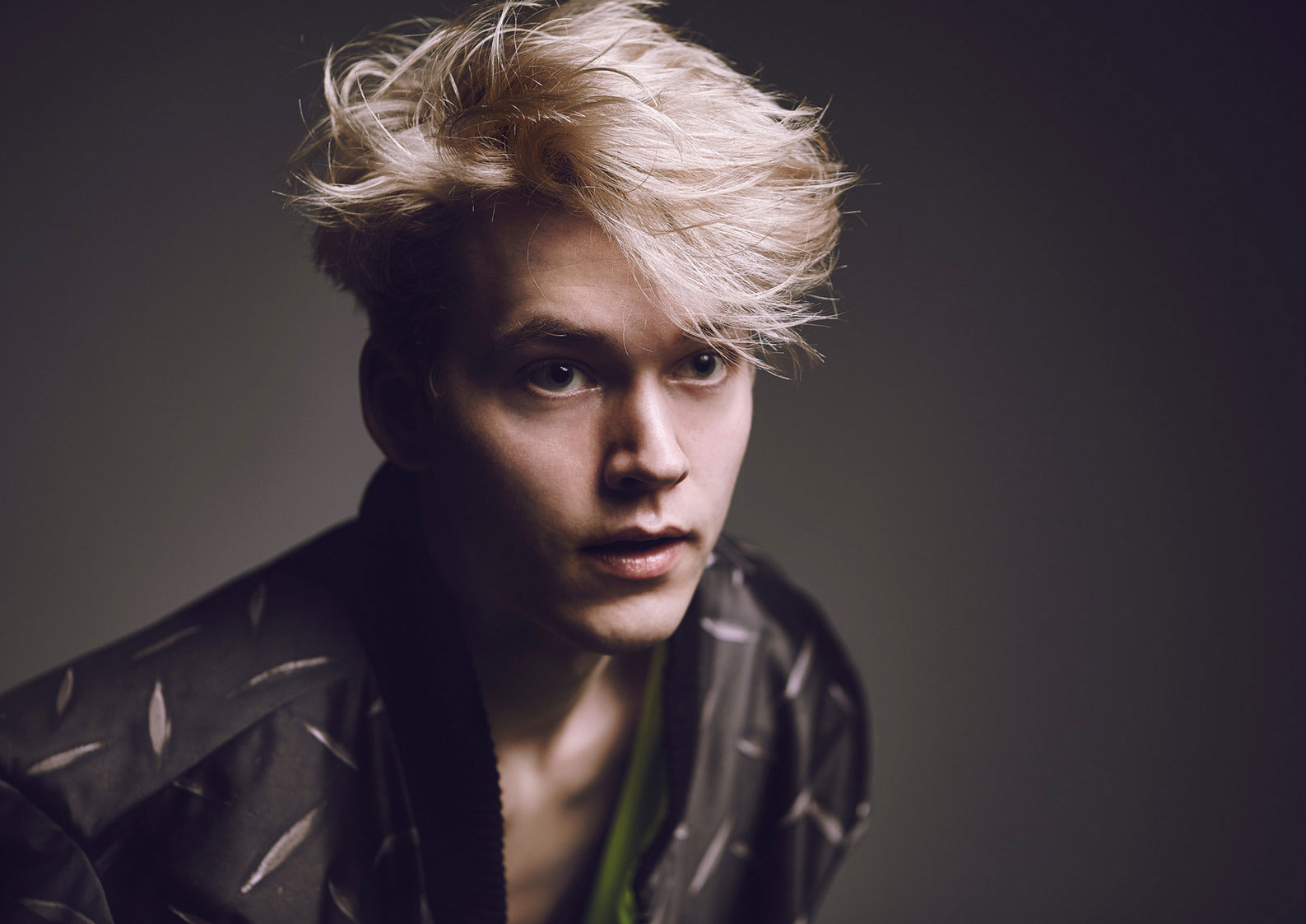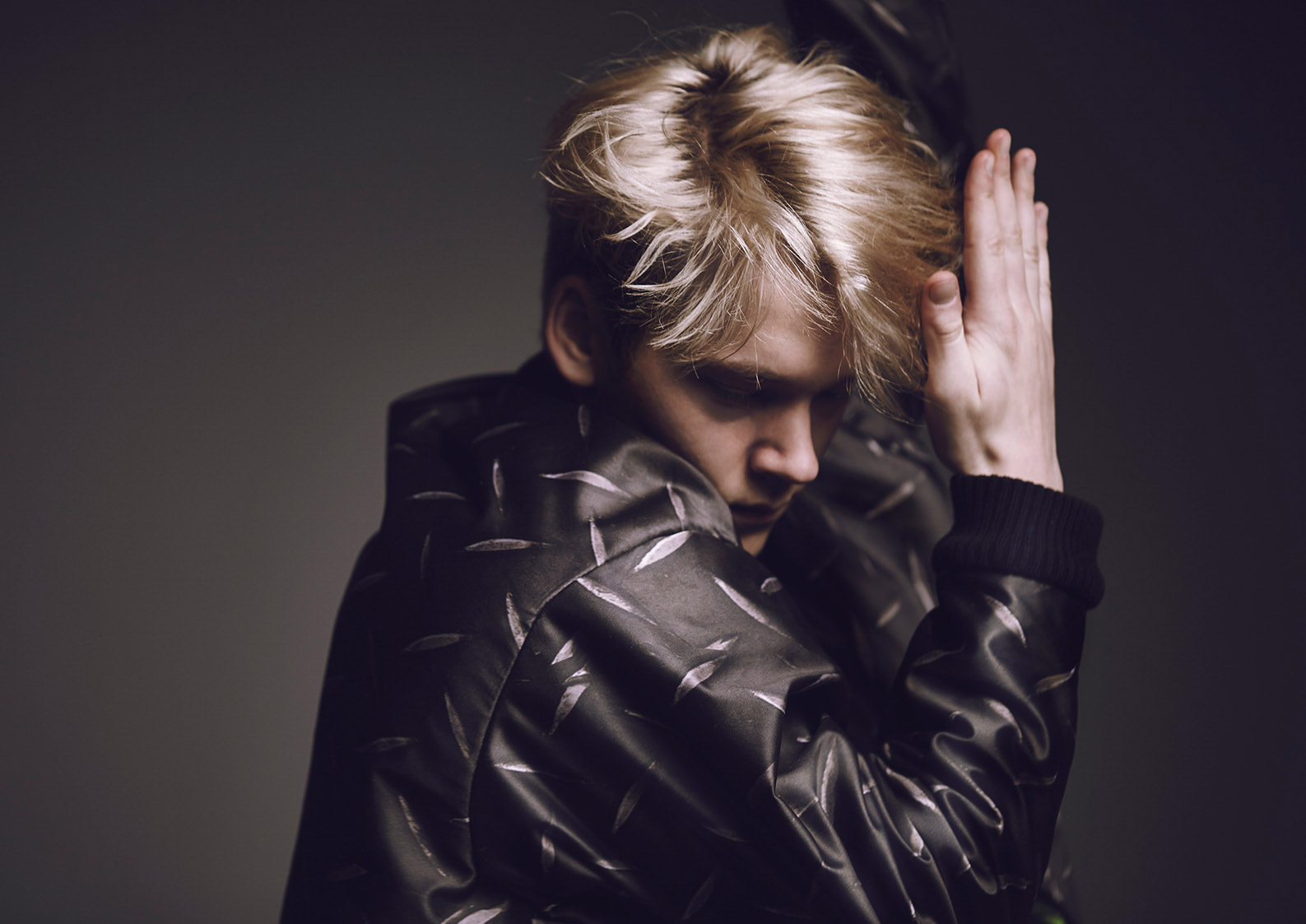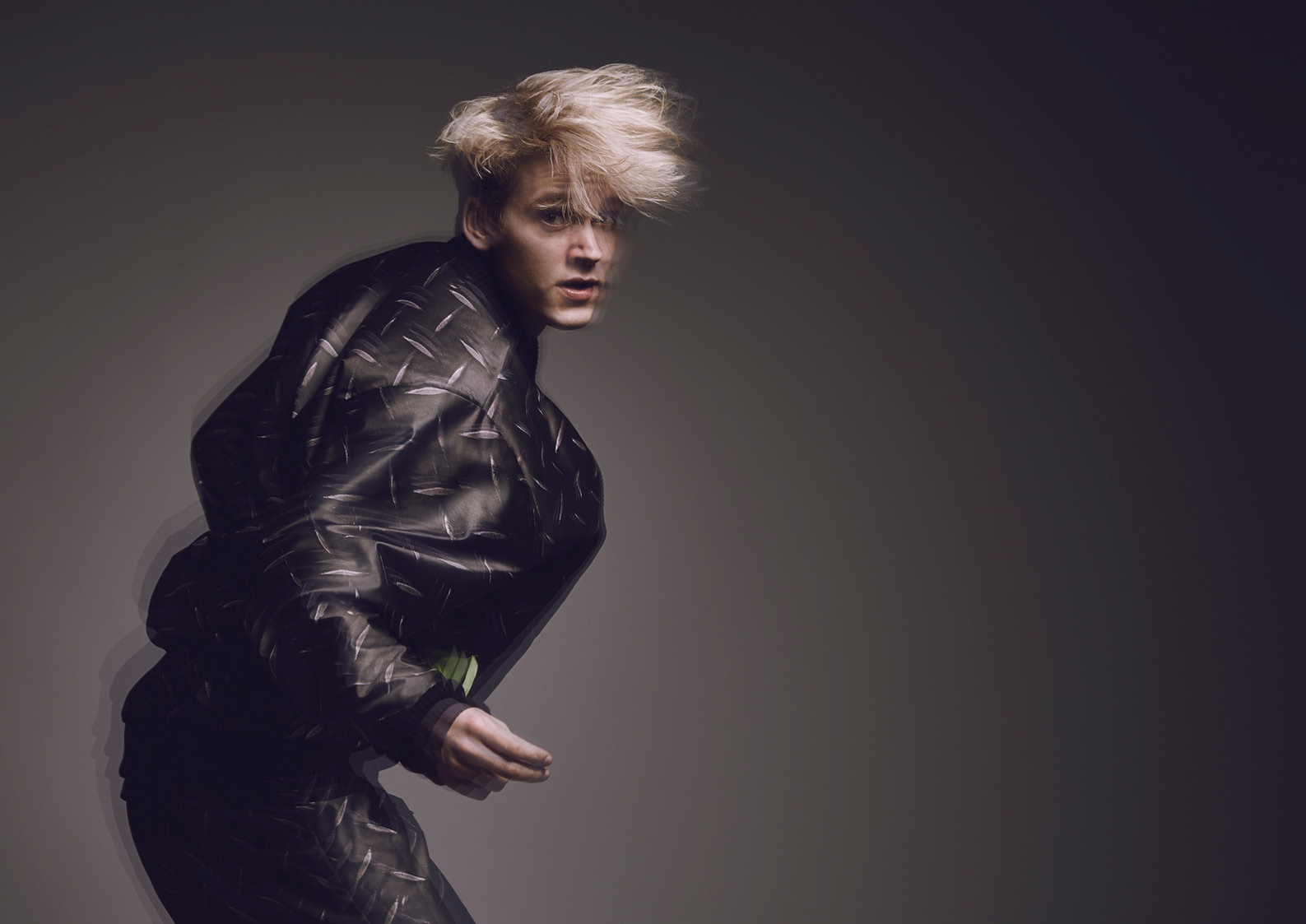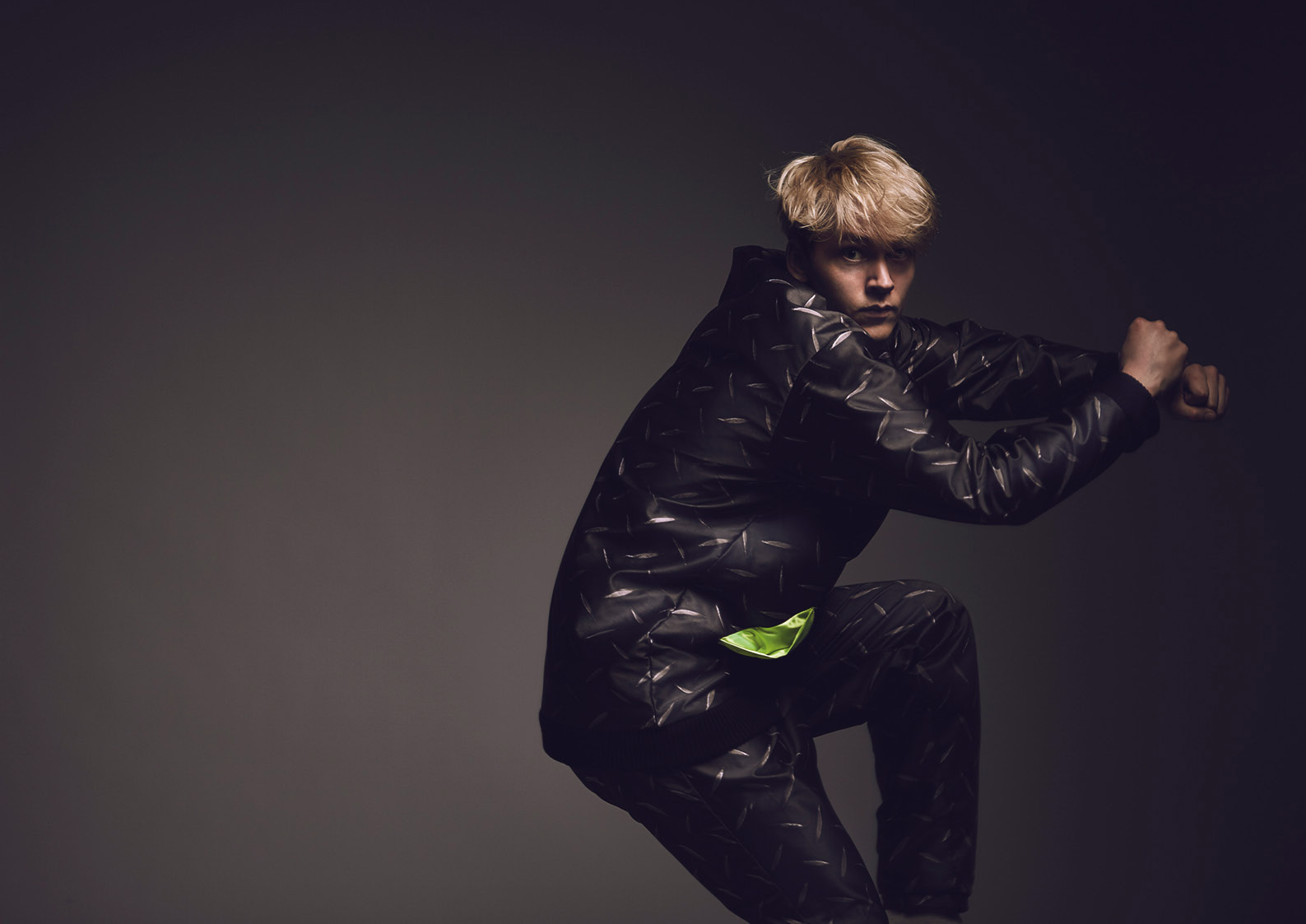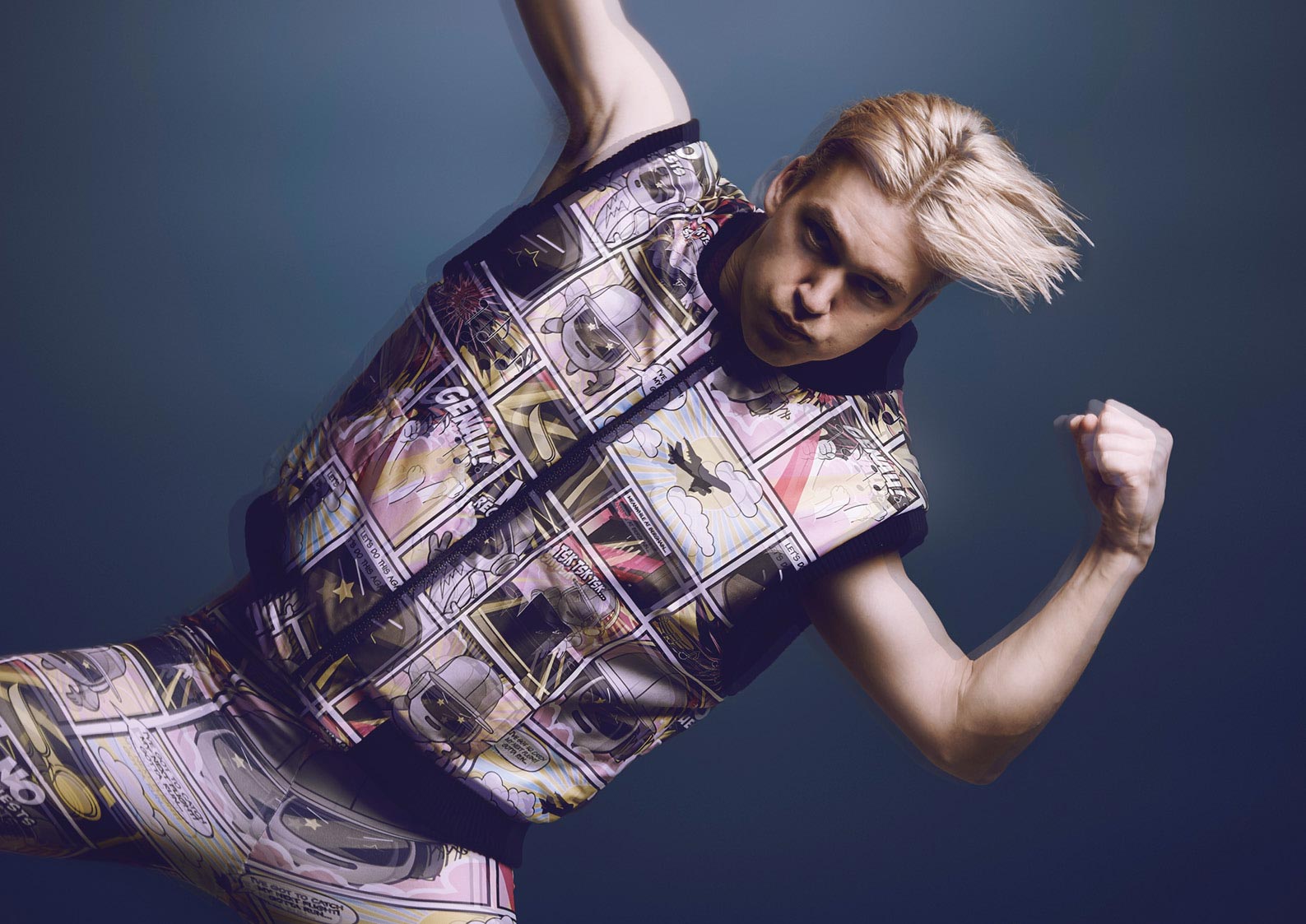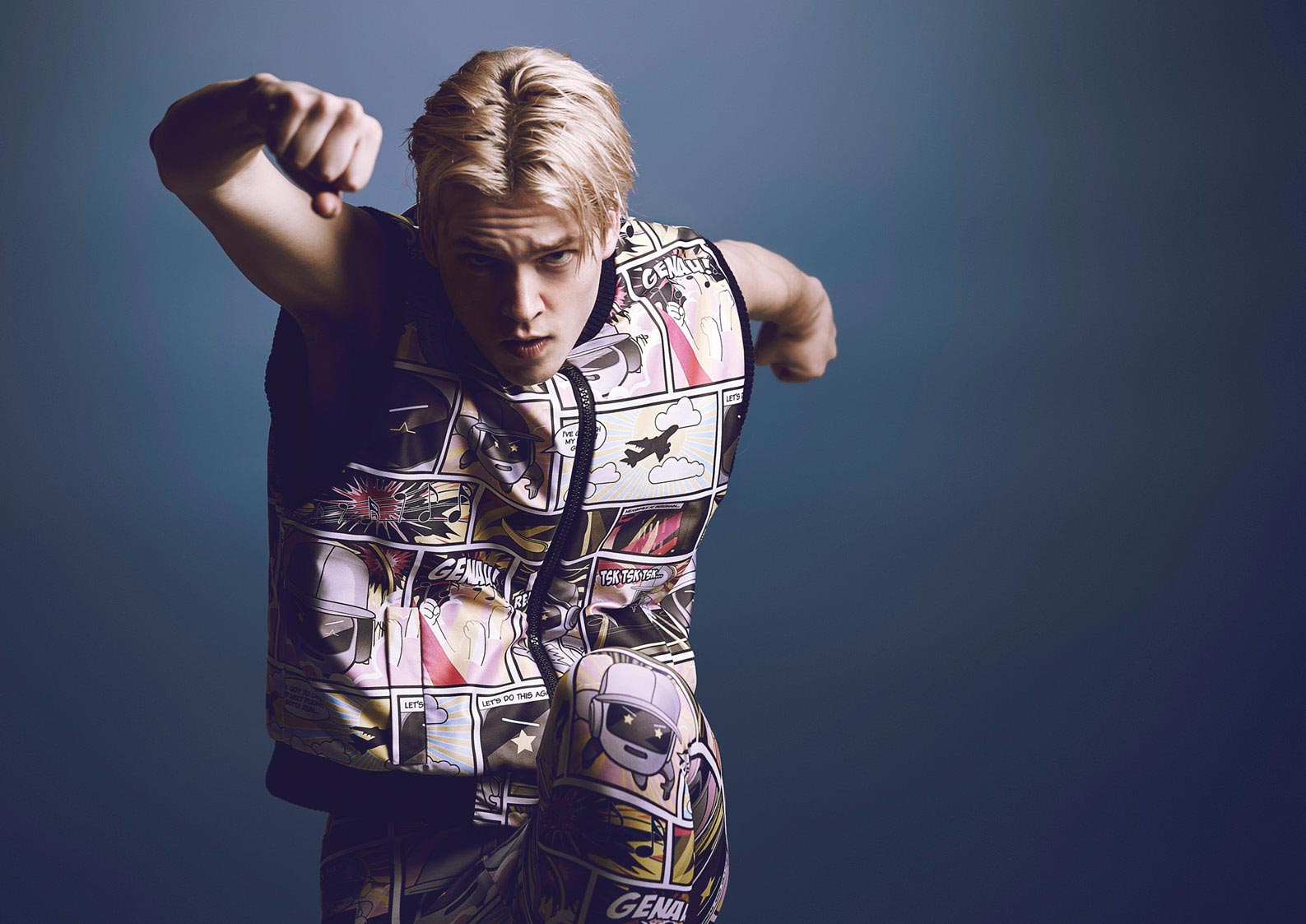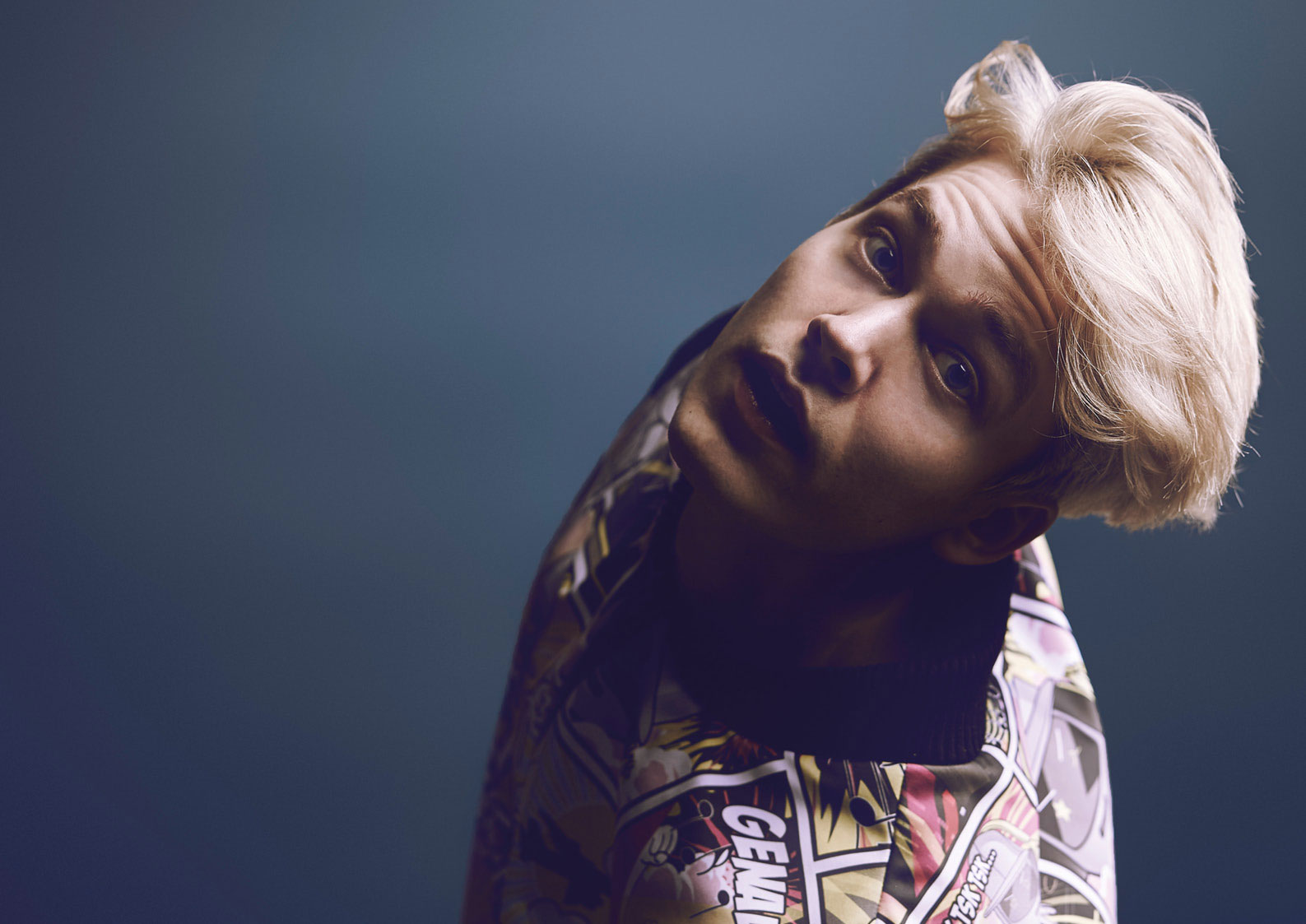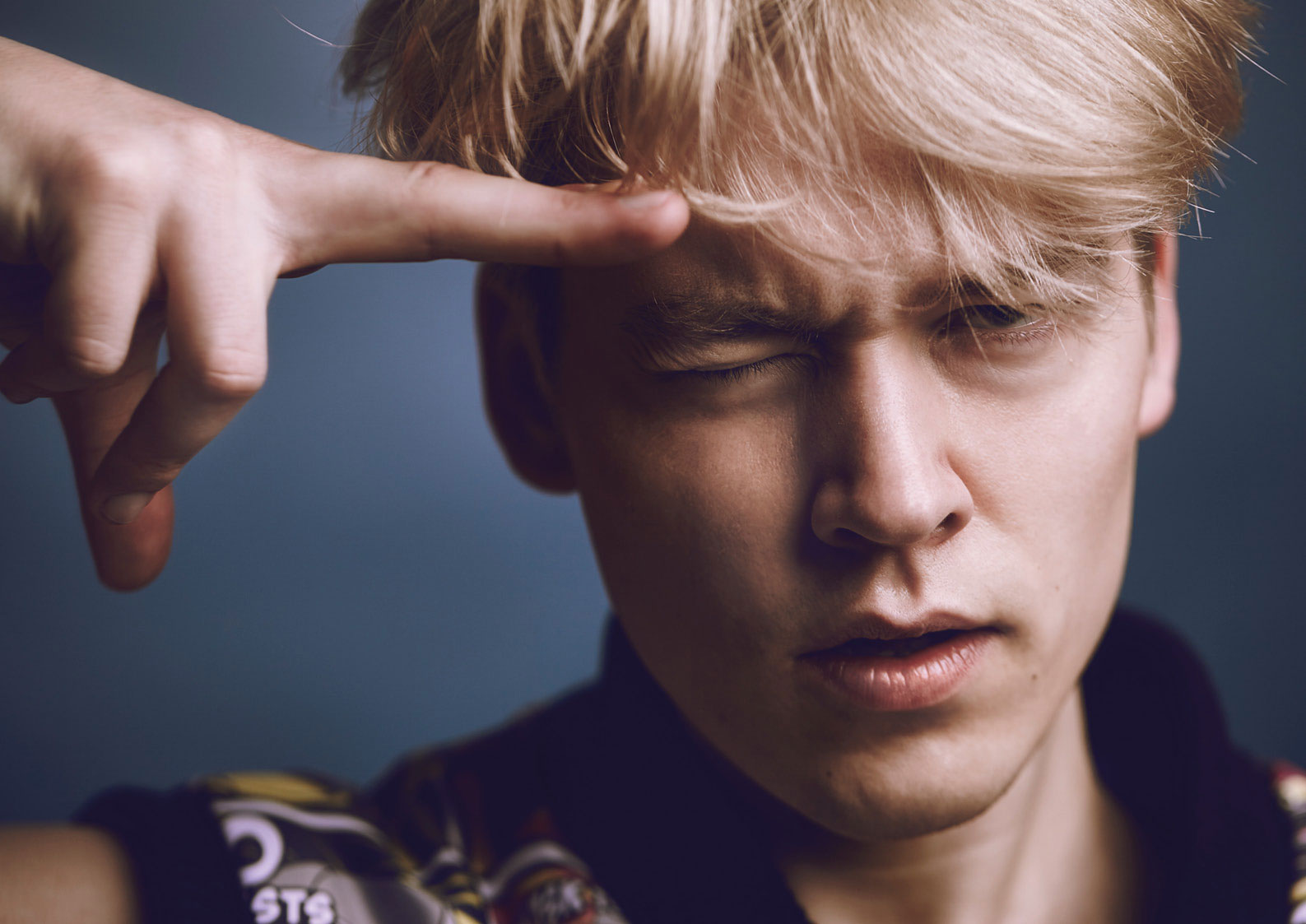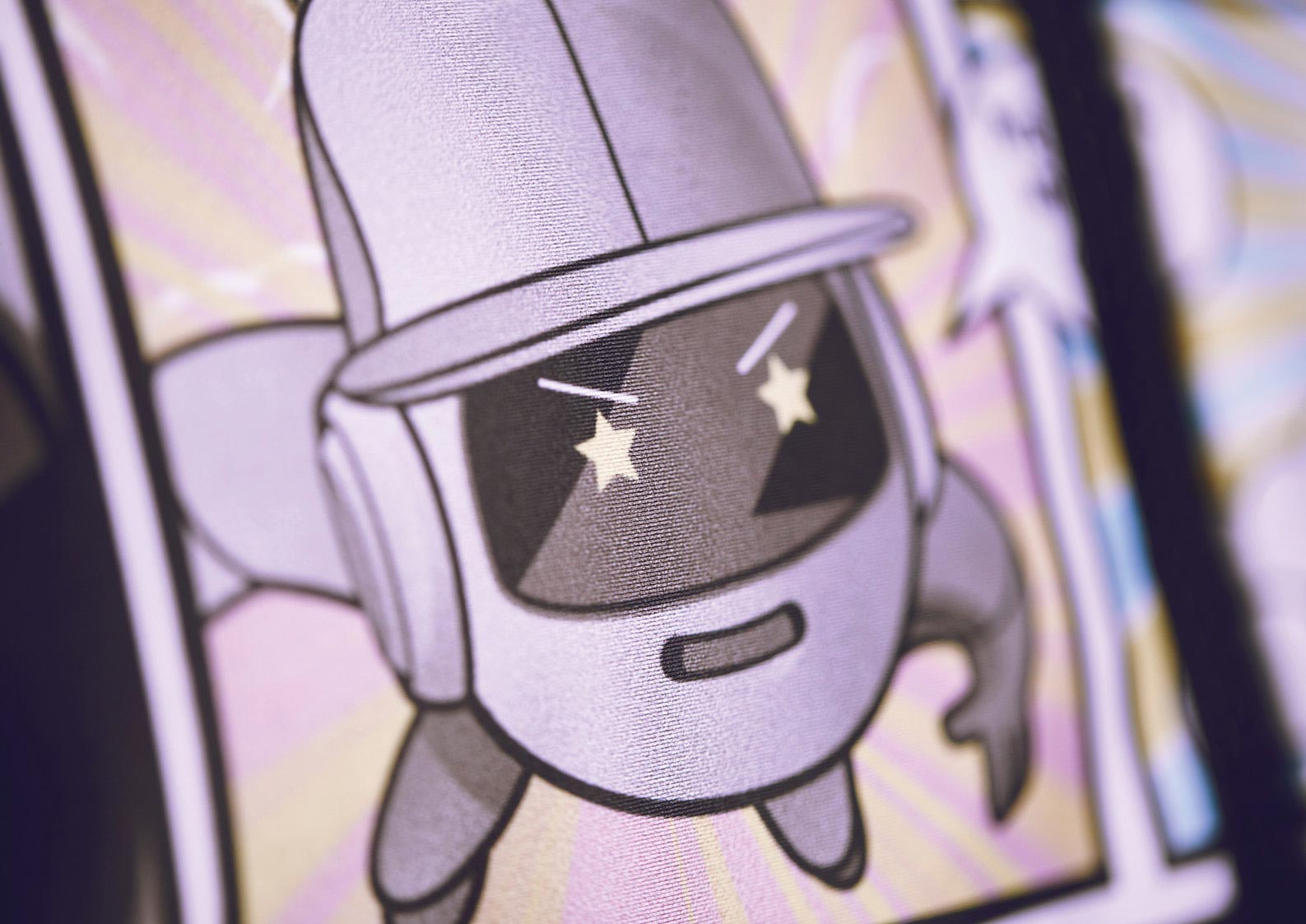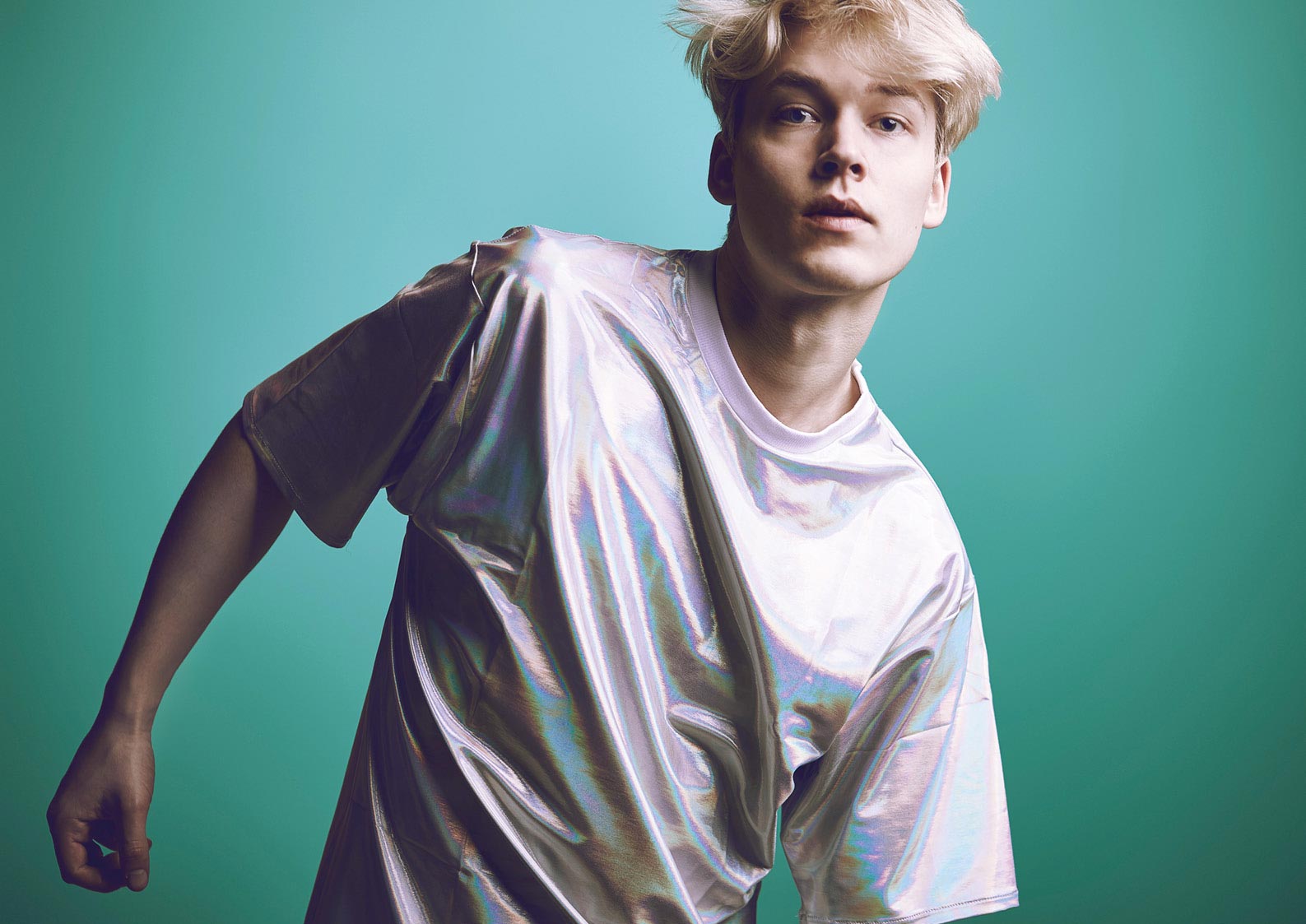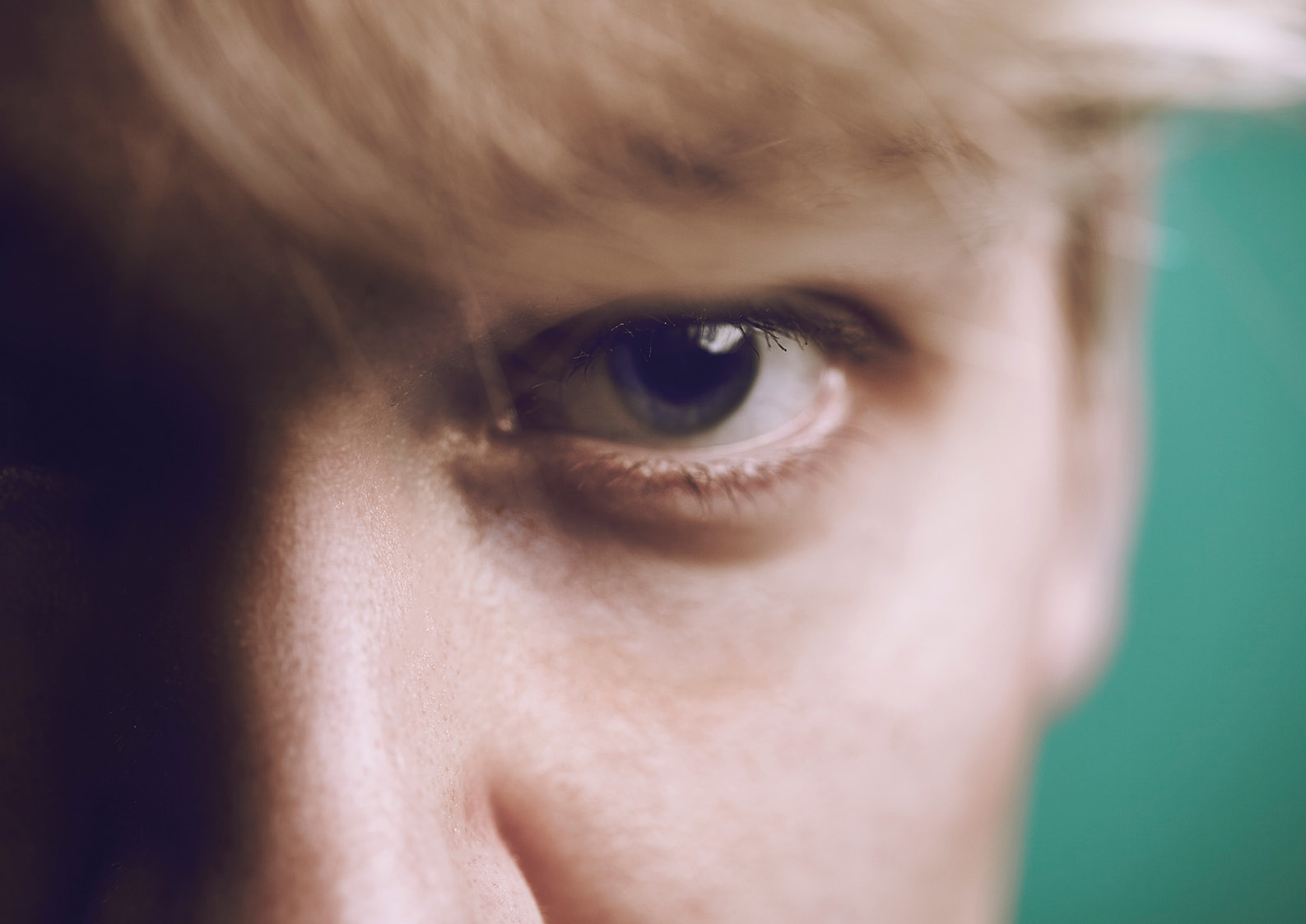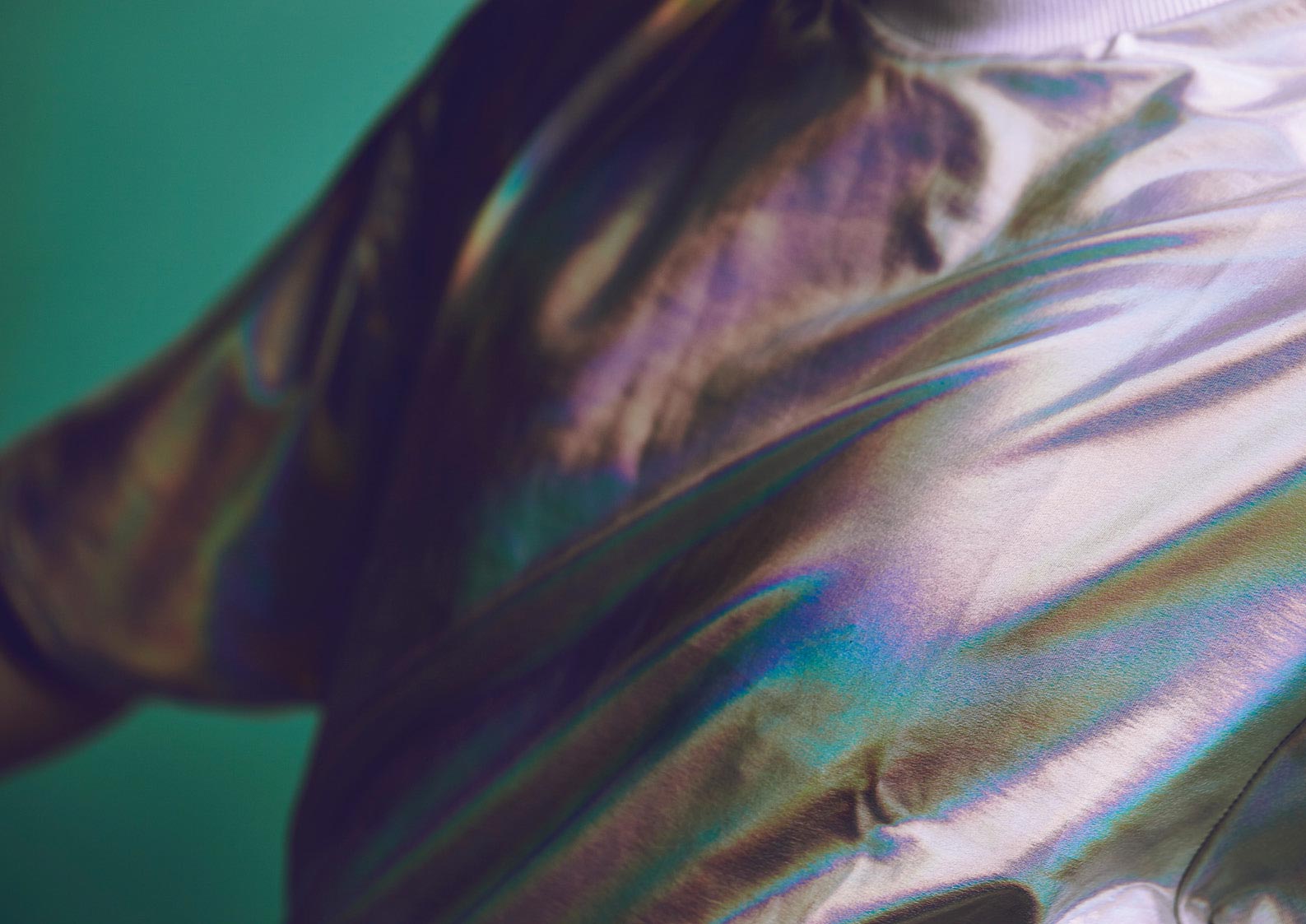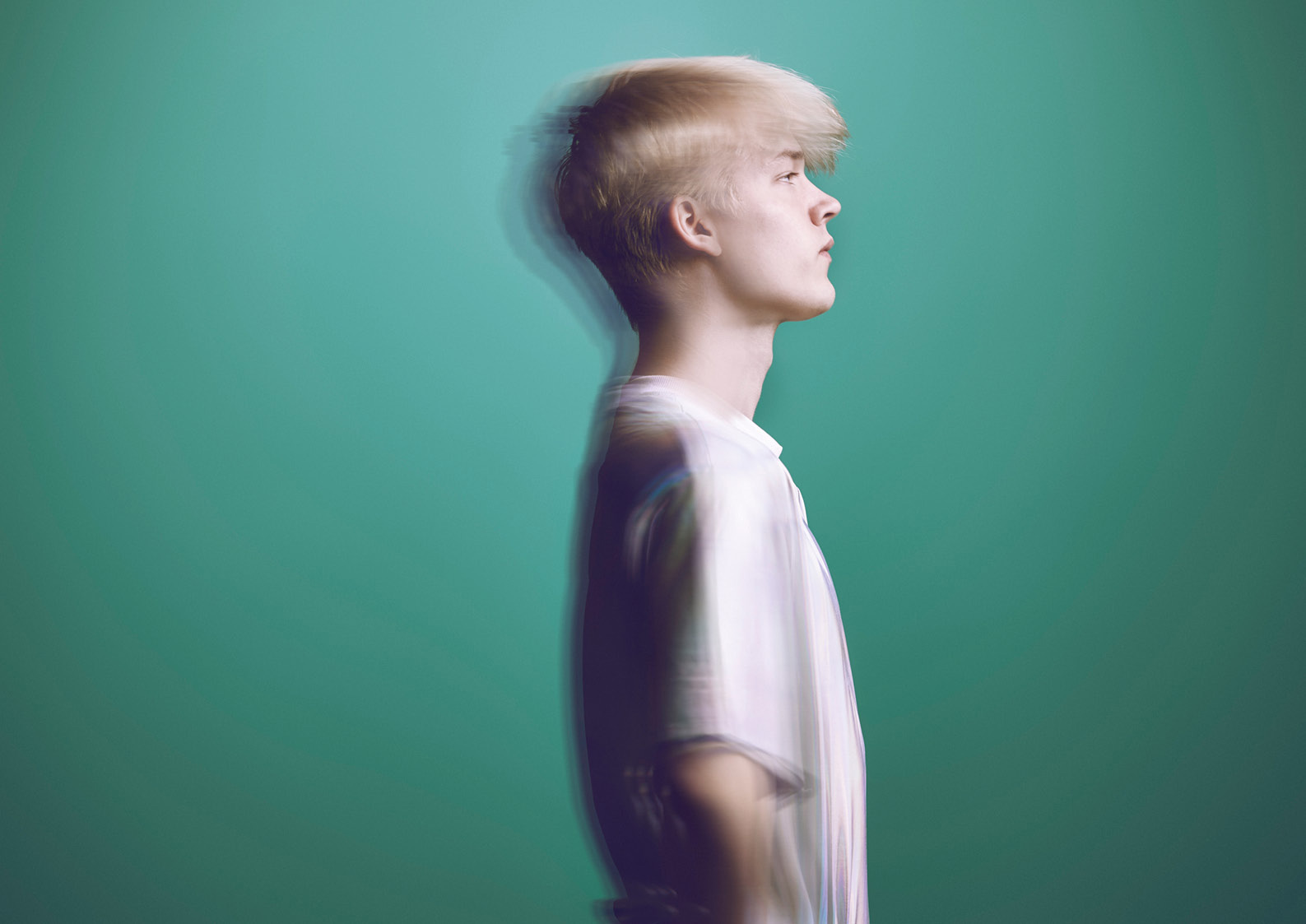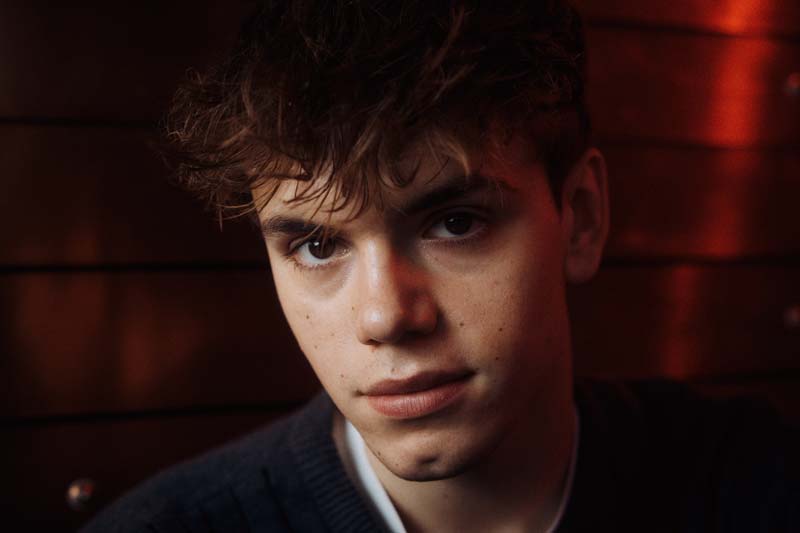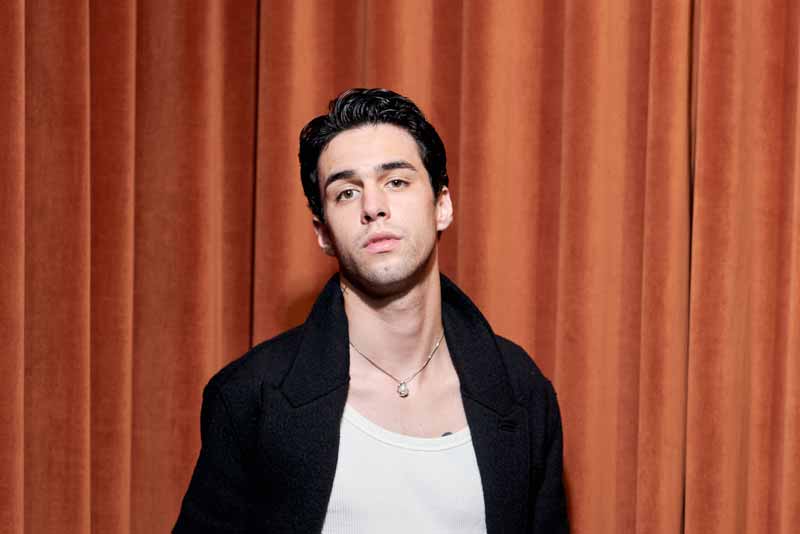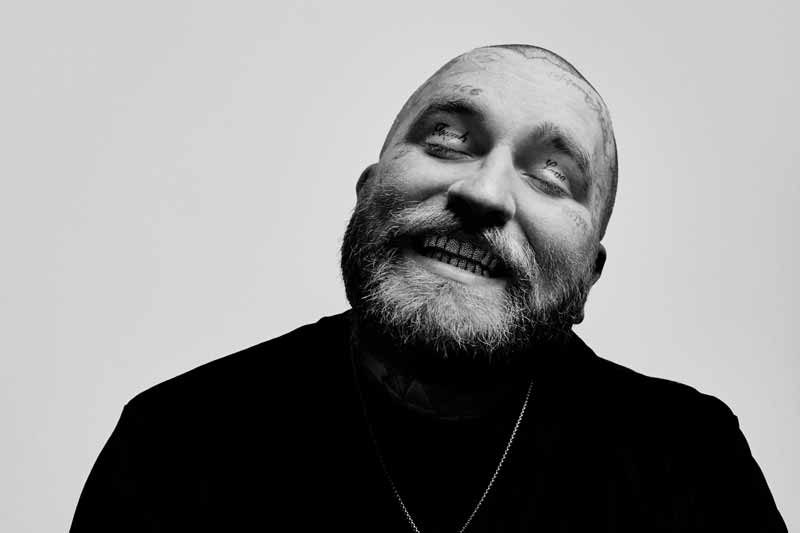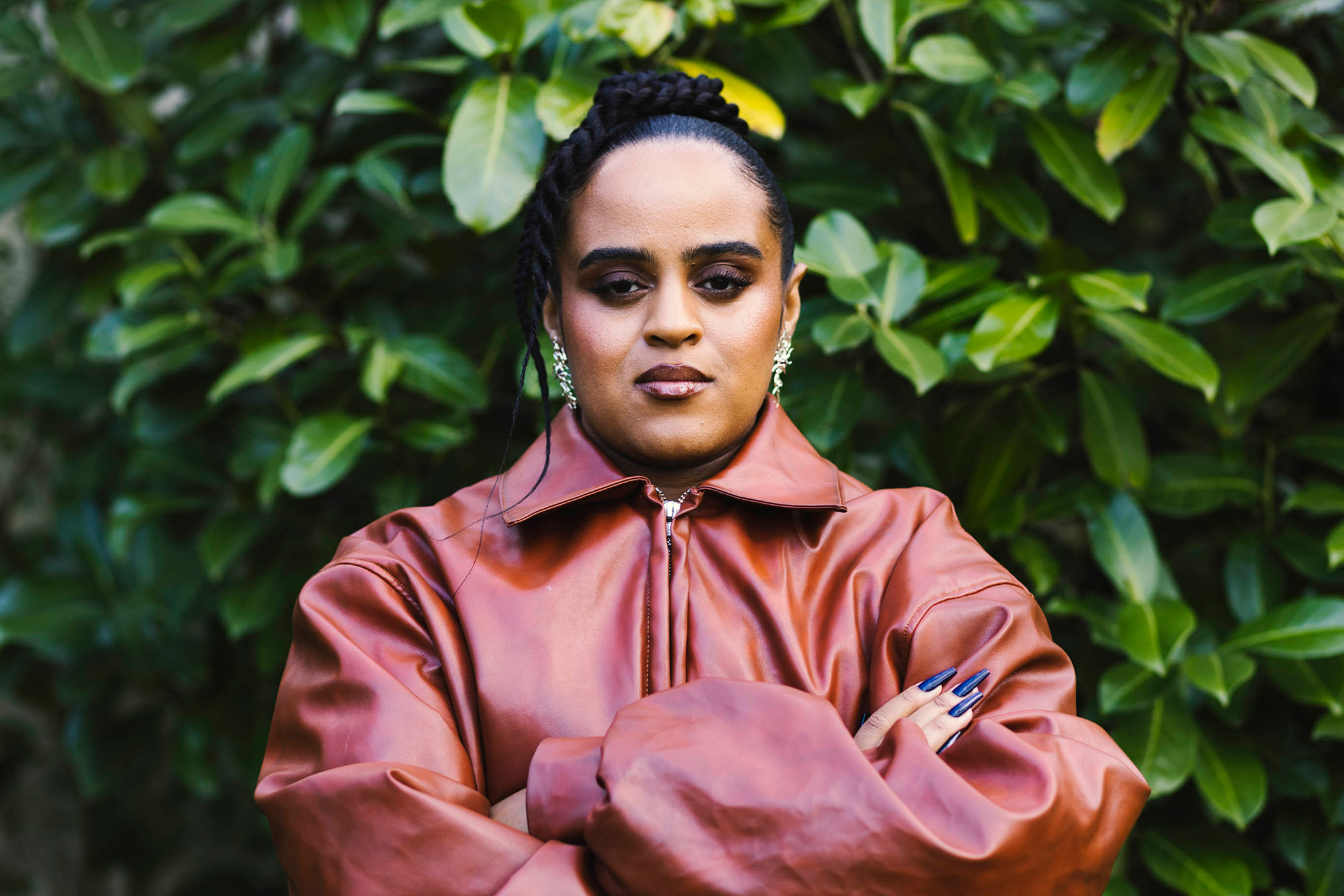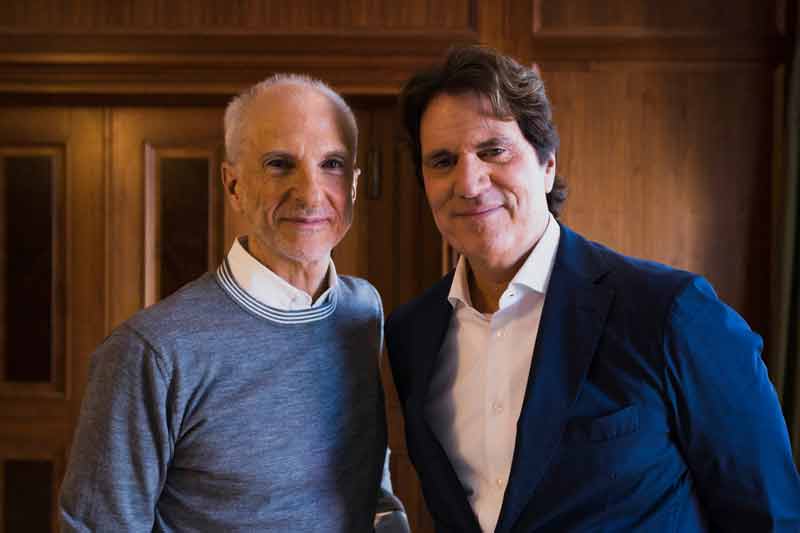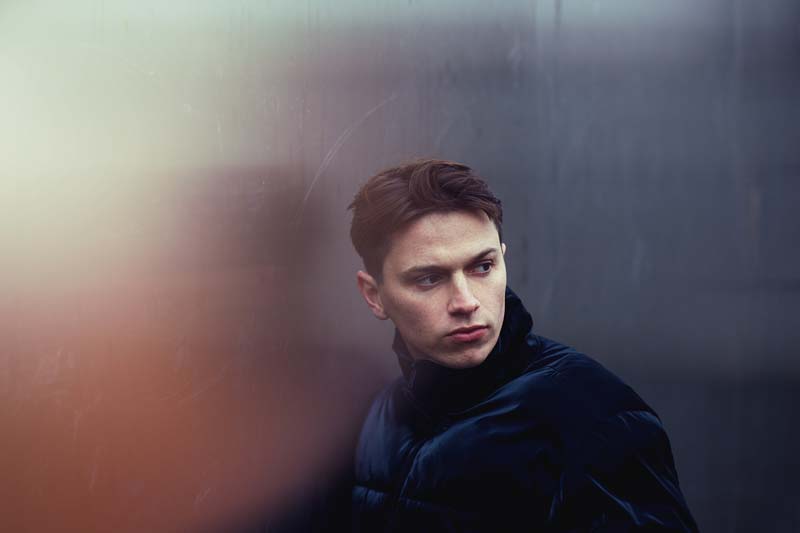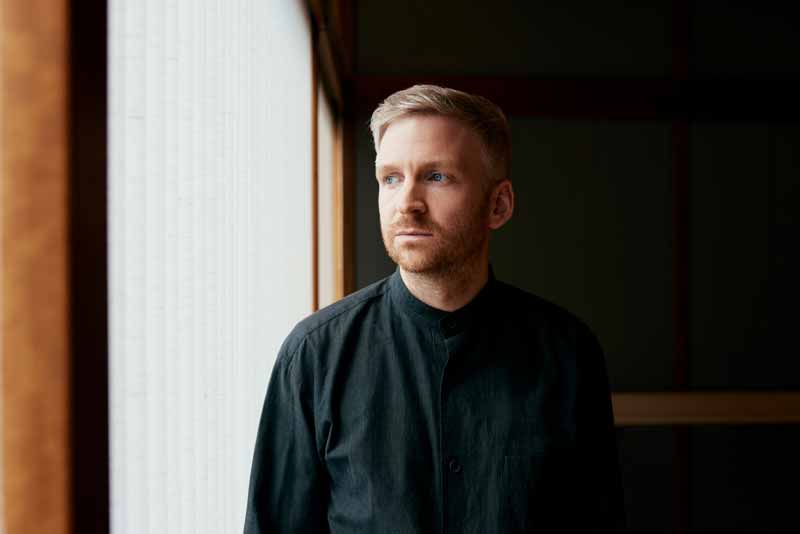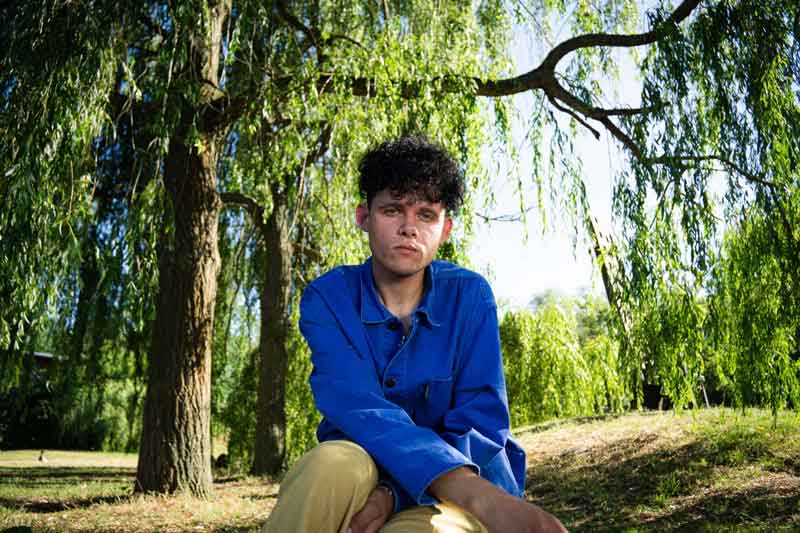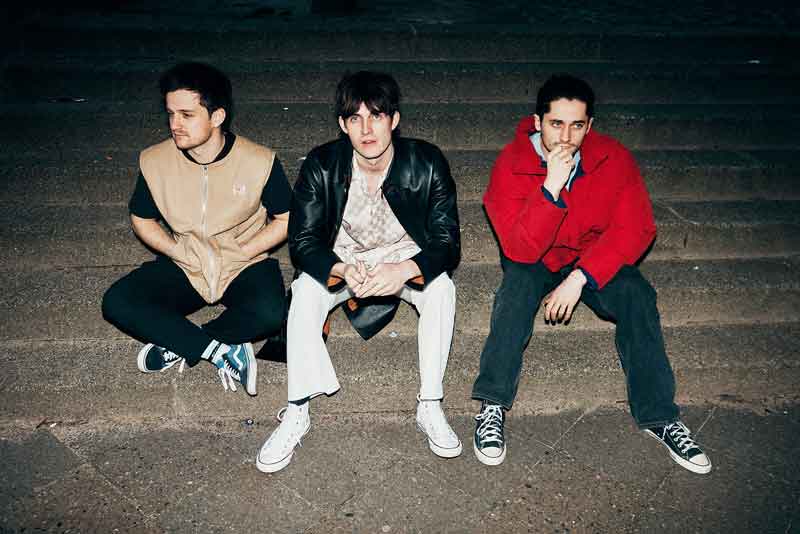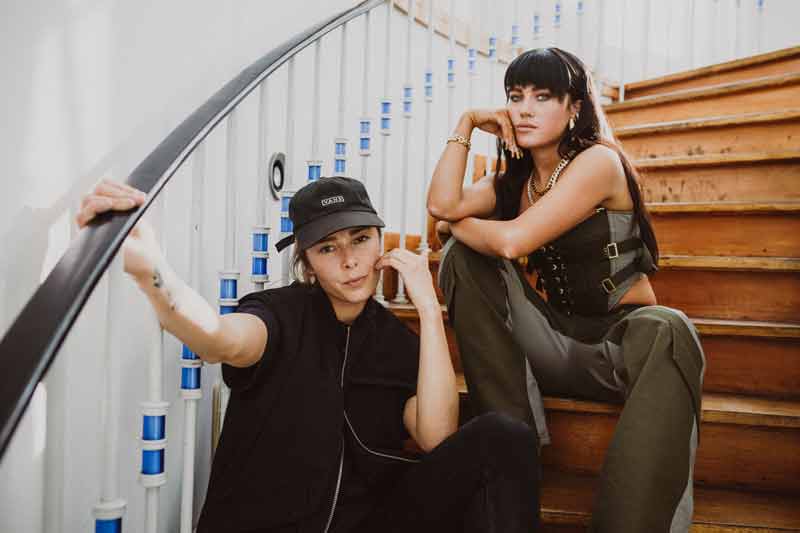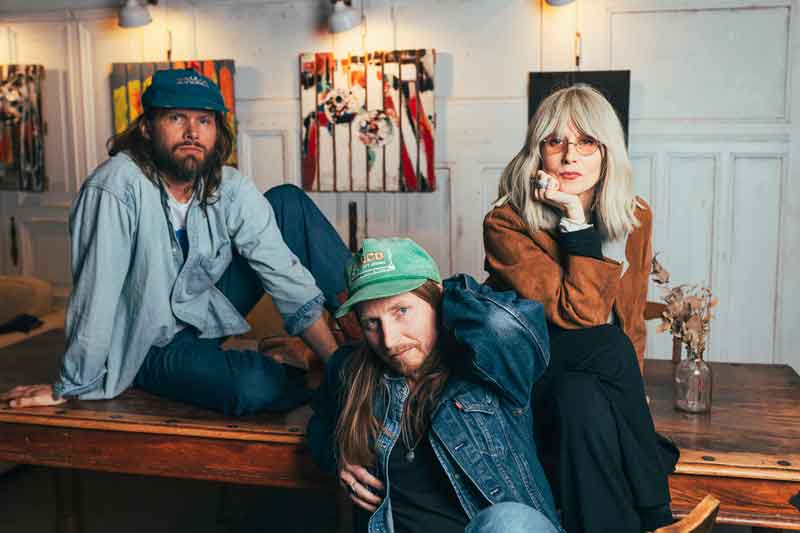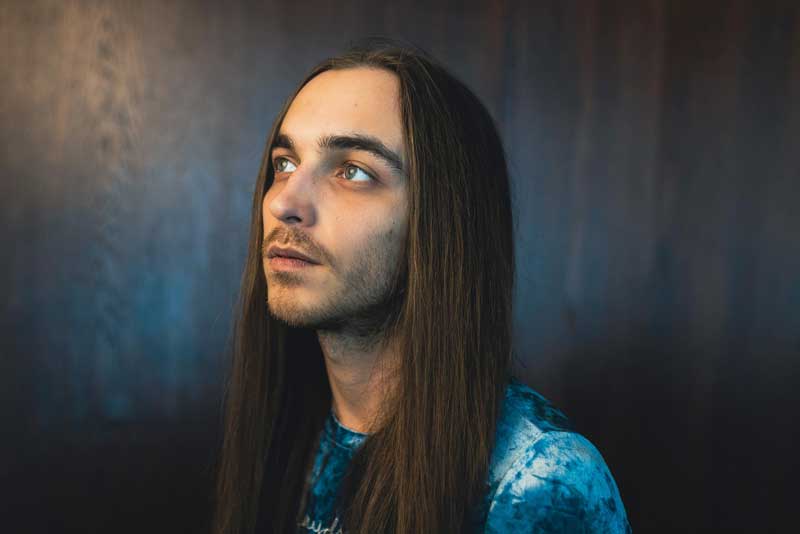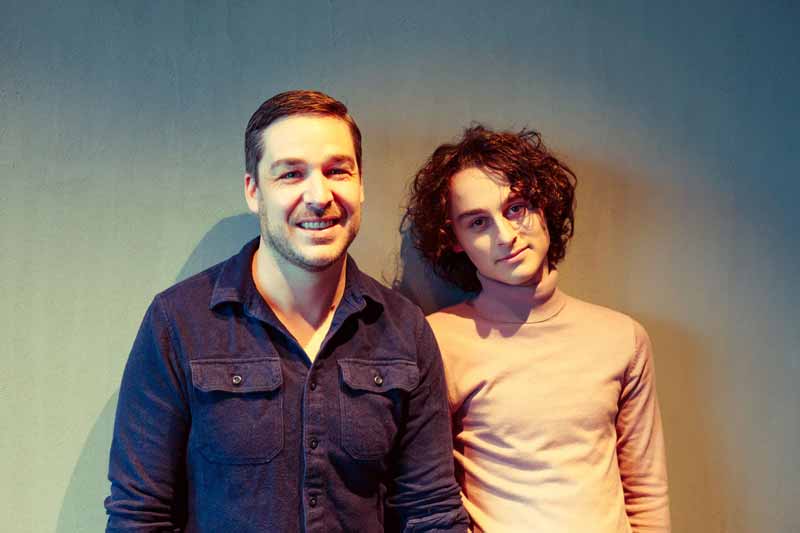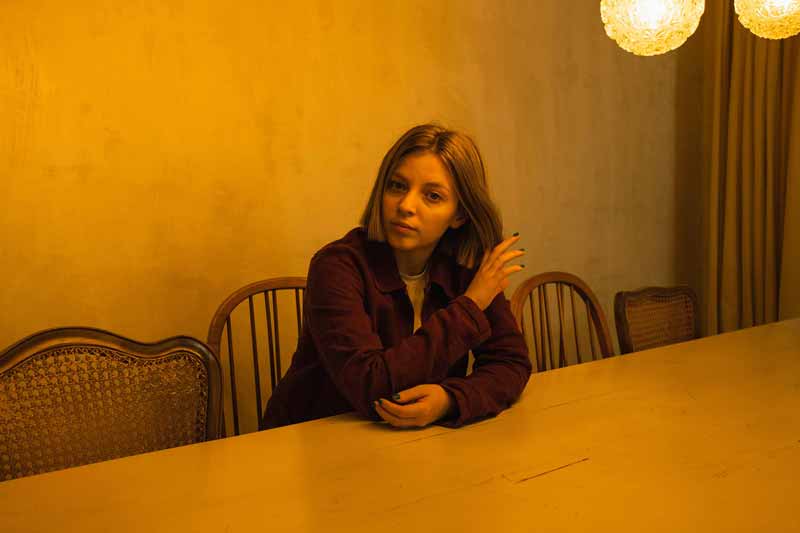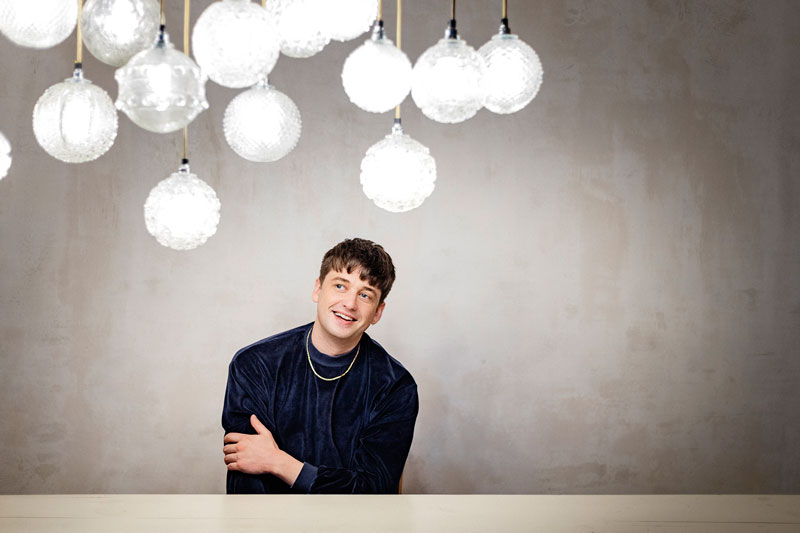Interview — Asbjørn
Leading The Dance
Once a fan from Finland asked Danish musician Asbjørn to help him get the girl. No wonder the matchmaker was successful, because his groundbreaking visual storytelling goes straight into our heart. Find out why!
3. Mai 2016 — MYP N° 20 »My System« — Interview: Jonas Meyer, Photography: Steven Lüdtke
Jonas (talking about the recording device):
It looks very old, doesn’t it? But actually it still works. Do you have something that is with you since you’ve had you’re first gigs?
Asbjørn (thinking):
I don’t care that much about this kind of stuff. But it’s funny, it’s this particular thing which is the main item when you do an interview. You look at it every time and you have a relationship to it. I don’t feel like that with any of my gear. But I do have a very old teddy bear that I got just when I was born. Still sleeping with that.
Jonas:
I read that the name Asbjørn is a combination of two words that mean „god“ and „bear“. Is that right?
Asbjørn:
Yeah, exactly.
Jonas (joking):
So the teddy is one part of your name.
Asbjørn (smiles):
Yeah.
Jonas:
Now you just have to find the „god“-part.
Asbjørn:
Yeah, I’m tryin to find that all the time.
Jonas:
A few weeks ago, you published your new record called „Pseudo Visions“. Could you explain what’s meant with this title? Sometimes people have visions, but what is a „Pseudo Vision“?
Asbjørn:
It was a definition that came pretty much out of the blue while I was writing what to me is one of the most important songs that I have written, „The Love You Have In You“. „Pseudo Visions“ became part of the lyrics and I just knew when I sang that out loud that it’s going to be a defining thing for the record. To me it’s about those moments that are so fucking intense that you can not avoid them. You have to be in them even though it seems almost dreamlike or maybe too intense, maybe you can’t deal with it in the moment really. But it’s unavoidable and important, this kind of moment. And that’s what I write songs about basically. Those moments.
Jonas:
So a „Pseudo Vision“ means extra-reality or more than reality.
Asbjørn:
Yeah, exactly. Where the world is surreal in itself and your own head and your own feelings seem like a revalation to you all of a sudden. You look at something in a new light. I think that’s why so many artists write songs about love because that is of course one of the „Pseudo Visions“, that is the kind of intensity. You have to be in it, there’s no way around it. And heartbreak is another, because you have to deal with it. It’s such a clean feeling, that kind of pain. There’s no cleaner pain than heartache.
Jonas:
I asked because „Pseudo Vision“ is the first big word that comes up when one tries to get in touch with you and your music, find out who you are and what you’re doing. And it’s interesting because when you click on your website and you see this name Pseudo Visions, you see that it’s these episodes of videos: every song is combined or related to a video. To me it felt like starting a new Netflix series.
Asbjørn:
Mh-mh.
Jonas:
You start with the first episode, then you can’t stop watching and you watch the next episode, and then the episode after that. And you come to a point when there’s no video left and you think: „Damn! When does the next season come out?“
Asbjørn:
That’s great! To me, it’s like that.
Jonas:
It’s a very innovative way to tell the story of your music. I’ve never seen it before. How did this idea come up?
Asbjørn (laughs):
First of all, I was really drunk…
Jonas:
That’s always the situation for good ideas!
Asbjørn:
…and I was hanging out with some friends of mine called Anders and Thomas that I’ve known for a long time. It was the year before we had made the video for „Strange Ears“ which was part of the first record. We were sitting there, it was really late and we’ve been smoking cigars and drinking Whiskey. I felt really drowsy and I think I was like: “Hey guys, how about just making a shitload of videos?” And they were like: “Yeah cool, let’s do it!” When I woke up the next morning I just knew that it was in fact a good idea, because suddenly I could start making music in a less long-term, less serious way. It was a very quick way to create that concept and say: „I got to just finish four songs, I got to just be happy with them“ and then I make the videos and get it out there. Then you move on to the next chapter where you’re free to do whatever, because especially the way I’ve been making my music takes a long time. I’m so into the whole production part and into testing everything and playing around that it is a very slow process. It’s a fact that if I wouldn’t make a full record in one take, but during two years, the first songs would be in a totally different place than the last songs. That’s what happened as well with „Pseudo Visions“. The whole concept was a way of saying that it’s okay to develop like that.
Jonas:
It can be stressful to work with friends.
Asbjørn:
Yeah, but I always do. And that’s why it’s possible as well. I would never be able to fit into that kind of gameplan of working with the „right“ people who don’t touch me. I’ve been in a lot of situations being put in a studio with a hit producer, having to make a hit song because my „big break“ was supposed to be right there if I just make this one song with this guy. So I’ve been sitting there making a really well-composed song and a very smoothly danceable production, but I didn’t give a fuck about it. And that’s what happens when you’re not fascinated by the people whom you work with – not only with the craft, it has to be the person for me. That’s when you surprise yourself, that’s when you expose yourself and get into some new freaky situation that you haven’t been in before.
Jonas:
There are two sides to the music business: one side is having to create something that sells, that people can approach and that pays your flat rent. The other side is being a serious musician, a real artist. Is it possible to make pop music that sells and to be a serious artist at once?
Asbjørn:
I think it’s about pop being natural or unnatural. For me, pop is very natural, I’m not afraid of pop, I love pop music.
Jonas:
There are people who are afraid of pop?
Asbjørn:
I think it’s getting better. I think we’re actually in the middle of a revolution in pop music. Very few people now actually feel ashamed saying they listen to pop music, whereas I remember growing up and having discussions with all the cool kids in town who were listening to Coldplay, Radiohead and Portishead that I really wasn’t into. And how they kind of shamed me for being such a pop boy because I loved Spice Girls, Backstreet Boys, Britney, Destiny’s Child and all of these extremely poppy artists.
Jonas:
What do you think is the reason why especially young people have a problem with pop music? Is it because it’s not differentiating since everybody is listening to it and they don’t want to be like everybody else?
Everybody is looking for their individuality and that process is so much more open now, also for the major popstars.
Asbjørn:
Of course everybody is looking for their individuality and that process is so much more open now, also for the major popstars. I think nobody is interested in conceptualized manifactured artists anymore. Everybody wants to see something real and that really is a conflict right now because on the one side we have youth culture that wants the real deal and we have the major label part of the industry…
Jonas:
…that wants to sell…
Asbjørn:
…and that wants to find the real raw talent. But then they want to conceptualize it, and there’s a specific kind of „real“ that is the „right real“ and then there is the „wrong real“. That makes it confusing because everybody just wants to be touched I believe. I think it’s becoming easier because artists who are within this major industry are generally more in control and have the chance to show who they are.
Jonas:
I’d like to talk about the very first music video that’s on your website. The first episode or first chapter, „Brotherhood“. The scenery starts with a very nice location somewhere in a small town. Is this where you grew up? Is it comparable to the place where you grew up as a child, as a youth?
Asbjørn:
Actually I lived totally on the countryside. The scene in the video is a very nice kind of neighborhood with the houses all the way down the road. I grew up on the countryside at this boarding school for grown-ups where people went to study music, theater, philosophy or writing for half a year. So I was raised with 130 siblings that went away and came back every half year. I got a totally screwed up relationship to ambition I think, because they went there and they just did something for half a year. They did it so much, there was no stopping them. That’s really where I learned to love music and to do it the way I do it. But of course the whole opening scene of Brotherhood is the transition from reality into surrealism. Chapter one is about surrealism and chapter two is about realism.
Jonas:
Would you say you had a happy childhood and youth or would you say it was complicated to grow up in such a small environment on the countryside?
Asbjørn:
That wasn’t the difficult part, that was the great part about my childhood. Because that was kind of like a mini-Berlin at that school…
Jonas:
…like a bubble.
Asbjørn:
Yeah, very much! And there were no pointy fingers, you just had to let loose and let it happen and anything was good really. Everything you wanted to be was accepted.
Jonas:
It’s very Scandinavian, right?
Asbjørn:
That mentality?
Jonas:
Yes, this very open-minded mentality. Because on the German countryside it’s not that easy for people.
Asbjørn:
Well, it wasn’t the countryside, that’s the thing. It was the school and that philosophy surrounding the school. I think any small town gives the weird kids a hard time, so I did have a hard time going to school but the great thing about it was that I had my oasis at that school where we lived. When I went to my regular school I could deal with anything because I had this strength from the whole vibe of my childhood home.
Jonas:
When and why did you decide to go to Berlin? It sounds very nice and it seems like you have everything that you wanted in this area and in your life there.
Asbjørn:
Adventure. You might see Scandinavia as an open-minded place, I wouldn’t say that it generally is. I would say everything is very much in order. There are no real risks you can take and I think people get lazy in Scandinavia because of that, maybe myself included for a while. It was a very kind of instinctive thing for me that whenever I would tour in Germany and end up in Berlin I would feel at home. I think that’s the same story that every artist that moves there tells…
Jonas:
…every lost person that comes to Berlin.
Asbjørn:
Yeah! The difference is how you deal with that chaos in Berlin. That is definitely one of the things that attract people as well, this overwhelming mass of opportunities and self-destruction and everything that the city has to offer. It totally destroys a lot of people and puts them on a wrong path, but it’s so fucking exciting to flirt with that border within yourself. That’s why artists are here because you have to choose self-destruction sometimes and then, at some point, you have to get back on track.
Jonas:
Sometimes it can be very creative, but you have to be careful. You can get lost in this city.
Asbjørn:
Yeah.
Jonas:
I can’t imagine that you have a problem going back from time to time. I think for you it must be very healthy and mind cleaning to visit your family in Scandinavia. Or is there a growing wall that brings you in the situation where you say: „Okay, I feel home here and I can’t handle my background anymore“?
Denmark is the calm, soothing stimulant that I need sometimes: going to the ocean and cleaning my mind.
Asbjørn:
No, I think those places have an oasis-kind-of-feeling for me. Of course, Denmark is the calm, soothing stimulant that I need sometimes: going to the ocean and cleaning my mind. I think I’m slowly accepting that I won’t ever find that state of mind in Berlin, and that’s cool. I got to find that in people then. Instead of nature or silence, I have to find this calm, soothing feeling in actual human beings, which I think is a great thing.
Jonas:
That’s a wonderful sentence.
(Asbjørn laughs)
Jonas:
I’ve never saw it that way. Berlin is a city of lost people, most people come from small places where they aren’t accepted for who they are, so they escape. They’re alive in this bubble, feel good and can’t imagine to go back. I think that point of view, this sentence of yours could help a lot to feel better in a lost environment where you don’t know anybody.
Asbjørn:
I think exactly the same. There are all these lost little creatures that end up in Berlin and all of us are strolling around each other and meet each other by coincidence. We got to find a way to really make it worthwhile that we’re here at the same time and that we don’t just become people passing each other, that we actually let each other be home.
Jonas:
We could sit in the metro and look at each other as strangers or we could sit anywhere and have an interview. It’s a coincidence.
Asbjørn:
Yeah.
Jonas:
The best thing in a big city is when you have a mutual relationship with your city. You take something and you can give something. Would you say you are in such a mutual relationship with Berlin? And if yes, what do you take and what do you give?
Asbjørn:
Good question.
Jonas:
Because a mutual relationship means having really arrived somewhere.
Asbjørn:
I think I give all of my best and most positive energy to the city and to the people. The city makes me want to give that everytime I go out. It makes me want to make eye contact with people, talk and hear people’s stories, dance. That’s the mutual thing really, because there is this unsaid life rule in Berlin it seems: you got to do it to the fullest, whatever you do. Whether it’s hugging way too much or falling madly in love, dancing: there’s no doing it halfway, you got to really do that move all the way out because that’s the intensity that everybody lives by. That’s why you get fascinated with so many people and the city.
Jonas:
You are in the really happy situation that you grew up in an environment where people were open-minded. In your school, it was okay who you are, who you’re with, what you want to do. There are a lot of young people that grew up in a town, in an environment of family and friends where they had to hide and where they didn’t have the courage to tell people who they are and what they want. So would you say your music or your art is giving these people some courage or power? Or is it too big of a picture?
Asbjørn:
I’ve never intended to do that because I really didn’t have that perspective on anything when I started making music. It was just for me. But what happens along the way when people start reacting to the music and start telling me their stories…
Jonas:
…but you know that there are these stories?
I can’t do anything about the fact that a guy from South Africa writes me that he is madly in love with his classmate but he can never tell him that because his father is a cop and he could get killed for showing this kind of love.
Asbjørn:
Exactly. It’s actually a pretty wonderful thing because a lot of my fans write me about their situations and I feel very lucky and fortunate that they want to tell me their stories. A lot of them are great stories about how they find a power within themselves through listening to a song of mine, which is fantastic. But then it’s always a feeling of powerlessness for me, too, because I can only do so much. I can only write these songs that help me and help some people on some level in their minds, but I can’t do anything about the fact that a guy from South Africa writes me that he is madly in love with his classmate but he can never tell him that because his father is a cop and he could get killed for showing this kind of love. Instead he chose to start a club for all the freaks and all the sexually curious people who don’t fit in the stigmatized world they live in. They meet up there and they listen to music and they talk about real things and give each other strength.
Jonas:
Is it a secret club?
Asbjørn:
Yeah, it has to be. And these stories are very hard to read because I can’t do anything specific to help this guy.
Jonas:
You make music.
Asbjørn:
That’s it, but…yeah.
Jonas:
I read that you said that there’s a lack of emancipation in pop music because there are so many women that have been successful in the last 40, 50 years and there aren’t a lot of men like that. At the moment, there are bands like Years & Years. Olly Alexander is a very good example for a new idea of pop music: a young men who knows exactly who he is and is totally open with it. Sam Smith is another example. They show that maybe pop music can change something.
Asbjørn:
Something is definitely happening, indeed. It’s great because when I started out, there was nothing like this really.
Jonas:
It started just a few years ago.
Asbjørn:
Like five years ago, there was nobody. Basically since I wrote an essay for „Nothing But Hope And Passion“ about this problem of a lack of diversity within the male pop icons, since then it’s just been developing so much and I can only blame it on youth. It’s something that started very naturally from a youth culture that needs a broader perspective in their everyday perception of the world. That’s when boys start to be more open towards themselves and stop worrying as much about the masculinity as this locked down muscly stereotype.
Jonas:
There are people that can change the world with music. Do you have some special musicians in your heart that are very inspiring to you and that belong to this circle of icons that could change something?
Asbjørn:
Well, David Bowie definitely is one of them, and he remains that. I had a really weird day that day, scrolling down the feed and looking at all of these sad RIP posts. I like his latest record, it’s intense. But I was so sad to see that everybody was mourning instead of celebrating. That man has to be celebrated, he was so strong until the very end.
Jonas:
Not only in a music-related way. I mean, he was the guy who said it’s okay to be different, to be a freak. Because that makes you interesting.
Asbjørn:
Yeah, exactly. He’s been so important and he’s going to remain probably the most defining man in pop culture. We just got to remind ourselves to aspire to be just a bit of that now, to continue his heritage. I find weird that, on the female side, we have so many women who have fought for diversity and freedom to be the kind of woman they want to be. That’s been happening for decades. On the other side, we have David Bowie who started around the same time as Madonna and he has in no way defined pop culture in the same way as Madonna has. David Bowie has only defined subculture and underground.
Jonas:
I would say he defined a state of mind.
Asbjørn:
Definitely.
Jonas:
By the way, there’s this wonderful picture that you use in one of your videos: the music tape. I think it’s a very beautiful symbol because it shows that you can give music away. I can donate music to someone I like.
Asbjørn:
Good old mixtapes.
Jonas:
Yeah! I mean, today all the romantic part is gone. When I want to share or give you some of the music I like, I send you a link. Or I create a playlist on Spotify for you. How romantic is that?
Asbjørn:
Yeah, it’s sick.
Jonas:
It’s a little sad, so it was nice to see this picture.
Asbjørn:
I actually have my first tape now as well. It was for this special vinyl box I did for Pseudo Visions. We made like fifty cassette tapes and it was the best feeling to stand with my own tape. Bigger than standing with my first vinyl or CD. It was like: this fucking thing, that’s my childhood. It’s a very romantic, nostalgic feeling because I knew on all my tapes exactly at what second my favorite song started. It was great.
Jonas:
How could you give music today to another person in a very individual, personal way? Is it still possible? Besides sending a link.
Asbjørn:
I think the best way is to go to a show, really.
Jonas:
You mean to take someone to a show?
Asbjørn:
Yeah. I think we did destroy the romance a bit, but going to a show and being so there, so present in that moment – that’s gonna be something you remember. That’s gonna be romantic for sure.
Jonas:
That’s just possible with artists who are still alive. I mean, everybody has three, four music artists in their hearts that they’re still carrying with them their whole life, and most of these artists aren’t alive anymore. So how to share?
Asbjørn:
Are most of your heroes dead?
Jonas:
Some, not all. You would have to take someone to your place and listen to music together.
Asbjørn:
Yeah, or make a Spotify club where you actually listen to albums once a week or something.
Jonas:
From the past to the future: as I already said, you wrote on facebook that you haven’t been out for days because you’re writing new stuff. What is going on in your head at the moment, music-wise?
Nobody is writing me mails, I’m so bubble-minded right now, which is great. I think I’m having a lot of fun on my own at the moment.
Asbjørn:
I think I’ve been surfing on a wave the last six months, pretty much from making the last video to Scandinavian Love, touring and doing the whole album release in Europe. It’s been intense and I never settled down after that whole craziness. So I wake up and I’m just making music every single fucking day and it’s amazing. It’s like the world has finally understood that I don’t want to deal with it right now. Nobody is writing me mails, I’m so bubble-minded right now, which is great. I think I’m having a lot of fun on my own at the moment. It’s the first time that I’m producing a whole record on my own. I think at some point, I’m gonna have to finish it with somebody else because I want to be surprised with this record myself. It shouldn’t be exactly how I want it to be. You want to push it further. So yeah, I’m just working on my masterpiece really.
Jonas:
To me, it seems like you started a new chapter with „Scandinavian Love“, referring to the visual world you’re creating. Everything is very clean, you have a lot of strong pastel colours. Everything seems to be in order. Why did you make this visual mind shift? And is there a relation to the story or to the music?
Asbjørn:
You’re totally right. „Scandinavian Love“ was not really supposed to be on the Pseudo Visions album because I finished it in Denmark and then I moved to Berlin. Scandinavian Love was the first song I wrote and produced on my own here. I just had to include it, there was no way around it, even though I knew that it was a new direction. It’s a bit more in your face, a bit younger, because when I moved to Berlin I found out that I really had to be young still. I’ve been super focused since I started and that was the best thing for me, to allow myself to be young and stupid, more blunt and more direct in my music. There’s a lot of poetry and a lot of universal sense in that teenage kind of feeling that I’m experiencing a bit now. I think everybody relates to that and it’s nice to include all of the less poetic things into something that is art and is just exposing yourself really. There’s a lot of ugly sides to being human as well, a lot of shallow thoughts. I want to include that and I don’t want to be afraid to do that.
Jonas:
I think one of the most intensive ways to express yourself is your dance. As I said, I’ve never seen the idea of doing music videos in this order, chapter for chapter. To be honest, I’ve also never seen a person that is so intensively dancing on a small stage. Is the dance always existing first and then you add your music to it or do you create your music and add a dance to this component?
Asbjørn:
It varies a bit. Starting by being extremely fascinated with pop music and African music when I was a kid, dancing has been very important indeed. To me, those tempers are super exciting to work with: either I dictate the music with my body or I dictate my body with the music. I have to change between the two and I think it’s a great thing because it makes me be very intensively in my head and then let it go and be in my body.
Jonas:
It’s very interesting: when you go to a rock concert, the bands are playing and people in front of the stage start to pogo and dance. When I visited your concert, people were dancing but they weren’t able to dance as intense as you did. So you turned the picture, you know what I mean?
Asbjørn (laughs):
That people should go crazier than me?
Jonas:
It was interesting to see. You were leading the dance.
Asbjørn:
Yeah, indeed. And I can’t help it, if there’s three people in the crowd I would still do it because that’s a part of music for me. It’s impossible not to dance.
Jonas:
But what is happening with you in that moment when you’re dancing on stage and people are in front of you, looking at you. Do you see their faces, do you see what they express, how they react? Or are you in trance?
Dancing is sex basically. I have to look at people, I have to move slowly and have time to feel my body and get inspired by theirs as well.
Asbjørn:
No, I’m always very aware. Dancing to me is a very sensual thing. That’s primarily also why I very rarely go to techno parties here. I very rarely go to Berghain or stuff like that, because to me dancing is primarily about… dancing is sex basically. I have to look at people, I have to move slowly and have time to feel my body and get inspired by theirs as well. And a lot of the time, techno and techno culture doesn’t allow that. That’s the bubble, that’s the trance state of mind that I find boring. To me, it’s about people and exchanging energy and finding your sexuality and your body.
Jonas:
In techno clubs everybody is in their own bubble. It’s very hard to get in contact with people.
Asbjørn:
Exactly, and I don’t want people to feel like that at my show. Of course it’s great to stand at a show and zone out and just being consumed by the whole feeling, but I love when people look at each other and they meet somebody at my show that they connect with via dance. I think that’s one of the greatest situations: dancing with people you know nothing about, because you can tell so much about a person by the way they express their bodies on the dancefloor. If we just let each other in there I think we know each other pretty well already.
Jonas:
Is there a difference between the cities and the people living there related to their reactions or how they dance? Can you see that?
Asbjørn:
Obviously, Berlin is super flamboyant. People are very out-going and express themselves. But everywhere I go, my show is a chance to let go of your brain and your self-consciousness like I do and let your body talk instead of your mind. It happens pretty much everywhere. There are always people letting go and that’s why I love playing. No matter how many people do it, it’s a fantastic feeling when you let go.
Jonas:
You said that you get a lot of reactions, texts or letters. What’s the nicest compliment you’ve gotten?
Asbjørn:
I got a really cute message from a ten-year-old guy from Finland.
Jonas (surprised):
Ten?
Asbjørn:
A ten-year-old guy from Finland who was so in love with this girl in school. She really liked one of my songs, so he asked if I could make a videoclip where I asked her if she wanted to be his girlfriend. (laughs) It was the greatest thing to help that guy out. It worked, she wanted to. It was a very big thing for me to be the matchmaker. I was very honored to have played that role in their lifes. It’s so sweet!
Asbjørn is a 23-year-old music artist living in Berlin.
